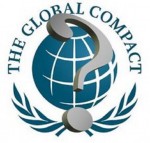
An interesting blog on Apesphere caught my eye last month.
“Has “CSR” become a code word for “profit trumps ethics”?” asked Andrew Newton, before reaching this rather worrying conclusion:
CSR has become shorthand way of saying a company’s ethical behaviour is only useful if it preserves or enhances the company’s bottom line (paraphrase)
Companies exist to make a profit, period. But should every business decision have to produce a maximised return on investment?
If you scratch the surface of many companies’ CSR policies, you soon discover that underneath it’s little more than donating money to worthy causes.
While this is admirable, it has nothing to do with changing corporate behaviour and the decision-making process.
Worse than greenwashing
This isn’t just greenwashing. Greenwashing is a marketing ploy through which a company intentionally attempts to deceive customers by adopting the green trappings of an eco-friendly company.
This is a real failure by the commercial world to understand that CSR means businesses decisions should be guided by wider considerations and not just profit alone.
That’s not to say that companies should become charitable institutions; far from it. But if responsible behaviour requires a cut in profits, then a CSR business should take the cut in profits and understand there’s more to life than money. NOTE: a profit is still made!
Nor is this charitable giving, scheme membership or standard compliance. It requires every single business decision to be measured against a notion of responsibility alongside the financial return on investment.
But isn’t CSR Ethical Imperialism?
Injecting ethics into a business seems like the next, most logical thing to do. After all, ethics is all about morality, and without that how can you define responsibility?
The big trouble is that ethics is also about culture.
Consider the USA, UK, South Africa and Japan, or Venezuela, India and China. None of these share the same culture. All have a political system founded upon the specific ethical considerations of their population in general.
Western proponents of ethical business need to be careful that they’re not advocating a form of imperialism. Neither capitalism nor communism are perfect enough to fit every human society on Earth – nor are western business ethics.
Chiquita’s Ethical Dilemma
One example of how unsuited ethics is for the corporate world is the plight of international banana magnate, Chiquita.
In 2007 they were fined $25m for supporting an illegal terrorist organisation in Columbia – the AUC and they now face protracted lawsuits from Colombians claiming damages.
Chiquita first started paying “danger money” to the AUC in 1997, as the Colombian civil war reached it’s most recent peak. In 2001 the AUC was officially recognised as a terrorist group in the USA, making such payments illegal.
That still leaves 3 years before Chiquita stopped making the payments and informed authorities that they had been the victim of extortion in 2004.
Ethically, what else were Chiquita supposed to do?
Refuse to pay danger money, leaving their employees open to attack and kidnapping? Withdraw completely, abandoning thousands of people and leaving a hugely profitable business in paramilitary hands?
In 2001 they published their first Corporate Responsibility report, which embraced the SA8000 standard. Tellingly, this states that in 2000 one of their Colombian plantations couldn’t be assessed “due to safety concerns”.
Chiquita are judged (quite fairly) to have broken the law and are now faced (quite rightly) with a multitude of legal cases from Colombian families. However, trying to enforce embedded ethics onto business will only encourage multinationals to fight shy of being in a similar situation, not encourage them to remain engaged.
So Please, Less Ethics…
This is why ethics should be left out of business. When faced with difficult decisions all ethics does is muddy the waters with compromises which make no-one happy.
Instead of trying to recreate the 19th century ethical business models to support industrial manufacturing, companies ought to be inventing 21st century business models needed to support an exploding global population.
These sustainable business models must be based upon sustainability: the principle that you only take what you can replace or what will “grow back” naturally.
Which means founding all business decisions upon a sustainable “return on resources” alongside the traditional return on investment.
… And More Sustainability
So, please, less of the ethics. Ethics are a personal belief, founded upon one’s life experiences and culture. They are not a universal language.
Instead, let’s have more sustainability. Let’s preserve the raw materials (mineral, animal or human) upon which all businesses are founded and ensure profits can be sustained for generation after generation.
And, as Andrew implies, let’s get away from our obsession that the bigger the profit, the better the business. As someone wiser than I recently said:
There are many things which money can buy, and a few things it cannot.
But there’re many more things which money should never be allowed to buy.
Photo credit: Thinking Ape by flasporty from flickr under Creative Commons Attribution License
 Captains of Industry often get a bad press. Their public image is as an exceptionally wealthy older man sitting in a glass tower, possibly stroking a white cat and waiting for the day the James Bond of regulation finally arrives.
Captains of Industry often get a bad press. Their public image is as an exceptionally wealthy older man sitting in a glass tower, possibly stroking a white cat and waiting for the day the James Bond of regulation finally arrives.

